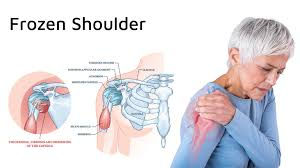Who Is Affected by Frozen Shoulder (Adhesive Capsulitis)?
- Lauren Walker
- Aug 10
- 3 min read
Frozen Shoulder, also known as Adhesive Capsulitis, is a painful and often debilitating condition that restricts movement in the shoulder joint. It develops gradually and can take months—or even years—to fully resolve. While anyone can technically develop a frozen shoulder, certain groups are more likely to be affected than others. So, who is most at risk?
Let’s take a closer look.

1. Middle-Aged Adults (Typically 40–60 Years Old)
Frozen shoulder most commonly occurs in people between the ages of 40 and 60, with the average onset around the mid-50s. It is rarely seen in younger individuals unless there's been a trauma or underlying health condition.
Why this age group?
Aging leads to natural wear and tear of joints and connective tissues.
Hormonal changes during perimenopause may contribute, especially in women.
2. Women More Than Men
Studies consistently show that women are more likely to develop frozen shoulder than men. The reason isn’t fully understood but may relate to hormonal factors and differences in joint laxity or inflammation response.
Interesting Fact:Women, particularly around menopause, are at significantly higher risk, possibly due to declining estrogen levels, which may affect joint and connective tissue health.

3. People with Certain Medical Conditions
Several underlying health conditions are associated with a higher risk of developing frozen shoulder, including:
• Diabetes (Type 1 and 2)
People with diabetes are two to four times more likely to develop frozen shoulder. It's also more likely to be severe and resistant to treatment.
• Thyroid Disorders
Both hypothyroidism and hyperthyroidism have been linked to adhesive capsulitis, although the mechanism is unclear.
• Heart Disease and Parkinson’s Disease
These conditions have also been associated with an increased risk—possibly due to limited mobility or systemic inflammation.
4. Individuals Recovering from Surgery or Injury
Frozen shoulder often develops after an event that limits shoulder movement, such as:
Rotator cuff injuries
Fractures
Shoulder surgery
Stroke
Limited movement during recovery can lead to joint capsule tightening and eventual adhesions, leading to stiffness and pain.
5. Sedentary or Inactive Individuals
Lack of movement—whether due to lifestyle, occupation, or recovery from illness—can increase the risk of joint stiffness and adhesive capsulitis. Regular shoulder mobility and range-of-motion exercises can be helpful in prevention.
6. Previous History of Frozen Shoulder
Unfortunately, if you’ve had frozen shoulder in one shoulder, you're at higher risk of developing it in the other shoulder, often within a few years.
Frozen shoulder can affect anyone, but it's most common in:
Adults aged 40–60
Women, particularly around menopause
People with diabetes, thyroid issues, or other chronic conditions
Those with limited shoulder mobility due to injury, surgery, or stroke

What to Do If You're at Risk
Early intervention is key. If you're experiencing stiffness or pain in your shoulder that limits movement, don’t wait—talk to a healthcare provider.
Proactive movement and awareness can make a significant difference in outcomes. Know the risk factors, listen to your body, and seek support early.
Relish Well-ness to the Core with our Relaxing Massage Sessions: Wellness Rituals offers effective alternative healing therapies such as Thai Yoga Massage or our Table Top Stretch Sessions. This unique healing therapy incorporates Yoga, pressure points, and reflexology, aiming to reduce body fatigue.
Relish A True Sense of Well-Being Through Expert Services
We use experienced approaches to promote good health in our clients through relaxing spa treatments and life-changing wellness services because We Care for You the Most!
Thank you for following us! Don't forget to find us via our website @www.myrituals.me or check out our latest blog posts on our Facebook and Instagram pages.
Let's stay connected through our social networks including Facebook, Instagram, and LinkedIn all are found at
Facebook : https://www.facebook.com/wellnessritualsme
Instagram: https://www.instagram.com/wellnessritualsme
You can always BOOK ONLINE!
Orlando Location: www.vagaro.com/mywellnessrituals
Longwood Location: www.vagaro.com/wellnessrituals-longwood
Text to Book: 407-535-2331. Thank you for following us!
You'll see that we have something new posted every day - so keep checking back!



Comments